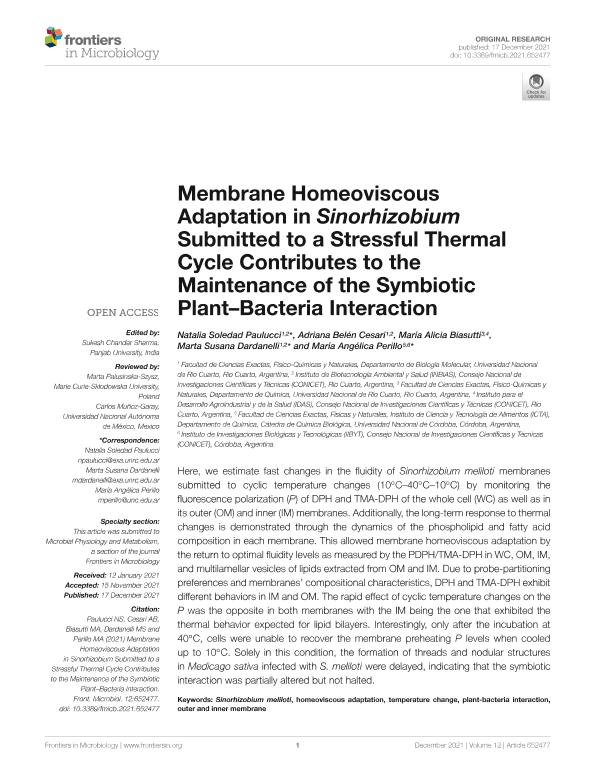Artículo
Membrane Homeoviscous Adaptation in Sinorhizobium Submitted to a Stressful Thermal Cycle Contributes to the Maintenance of the Symbiotic Plant–Bacteria Interaction
Paulucci, Natalia Soledad ; Cesari, Adriana Belen
; Cesari, Adriana Belen ; Biasutti, Maria Alicia
; Biasutti, Maria Alicia ; Dardanelli, Marta Susana
; Dardanelli, Marta Susana ; Perillo, Maria Angelica
; Perillo, Maria Angelica
 ; Cesari, Adriana Belen
; Cesari, Adriana Belen ; Biasutti, Maria Alicia
; Biasutti, Maria Alicia ; Dardanelli, Marta Susana
; Dardanelli, Marta Susana ; Perillo, Maria Angelica
; Perillo, Maria Angelica
Fecha de publicación:
12/2021
Editorial:
Frontiers Media
Revista:
Frontiers in Microbiology
ISSN:
1664-302X
Idioma:
Inglés
Tipo de recurso:
Artículo publicado
Clasificación temática:
Resumen
Here, we estimate fast changes in the fluidity of Sinorhizobium meliloti membranes submitted to cyclic temperature changes (10°C–40°C–10°C) by monitoring the fluorescence polarization (P) of DPH and TMA-DPH of the whole cell (WC) as well as in its outer (OM) and inner (IM) membranes. Additionally, the long-term response to thermal changes is demonstrated through the dynamics of the phospholipid and fatty acid composition in each membrane. This allowed membrane homeoviscous adaptation by the return to optimal fluidity levels as measured by the PDPH/TMA-DPH in WC, OM, IM, and multilamellar vesicles of lipids extracted from OM and IM. Due to probe-partitioning preferences and membranes’ compositional characteristics, DPH and TMA-DPH exhibit different behaviors in IM and OM. The rapid effect of cyclic temperature changes on the P was the opposite in both membranes with the IM being the one that exhibited the thermal behavior expected for lipid bilayers. Interestingly, only after the incubation at 40°C, cells were unable to recover the membrane preheating P levels when cooled up to 10°C. Solely in this condition, the formation of threads and nodular structures in Medicago sativa infected with S. meliloti were delayed, indicating that the symbiotic interaction was partially altered but not halted.
Archivos asociados
Licencia
Identificadores
Colecciones
Articulos (IDAS)
Articulos de INSTITUTO PARA EL DESARROLLO AGROINDUSTRIAL Y DE LA SALUD
Articulos de INSTITUTO PARA EL DESARROLLO AGROINDUSTRIAL Y DE LA SALUD
Articulos (INBIAS)
Articulos de INSTITUTO DE BIOTECNOLOGIA AMBIENTAL Y SALUD
Articulos de INSTITUTO DE BIOTECNOLOGIA AMBIENTAL Y SALUD
Articulos(CCT - CORDOBA)
Articulos de CTRO.CIENTIFICO TECNOL.CONICET - CORDOBA
Articulos de CTRO.CIENTIFICO TECNOL.CONICET - CORDOBA
Articulos(IIBYT)
Articulos de INSTITUTO DE INVESTIGACIONES BIOLOGICAS Y TECNOLOGICAS
Articulos de INSTITUTO DE INVESTIGACIONES BIOLOGICAS Y TECNOLOGICAS
Citación
Paulucci, Natalia Soledad; Cesari, Adriana Belen; Biasutti, Maria Alicia; Dardanelli, Marta Susana; Perillo, Maria Angelica; Membrane Homeoviscous Adaptation in Sinorhizobium Submitted to a Stressful Thermal Cycle Contributes to the Maintenance of the Symbiotic Plant–Bacteria Interaction; Frontiers Media; Frontiers in Microbiology; 12; 12-2021; 1-13
Compartir
Altmétricas



